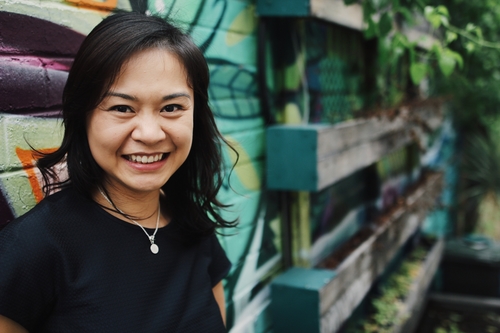
The little girl found by the side of the road had the signs of a serious liver condition. “Staff at the local hospital recognised her as a former patient but when her parents were tracked down, they were hesitant to visit,” recalls Maggie James, who works as a volunteer at the hospice in China where the baby was taken.
‘Bing-Bing’ was one of the many critically ill children abandoned by their families in China each year. Now Maggie, a paediatric palliative care music therapist who is also a UQ Business School Master of Business Administration (MBA) graduate, is on a mission to help them. In her new role as one of the International Board of Trustees for the Butterfly Children’s Hospices, she is supporting the Chinese government to establish its own paediatric palliative care services.
“It’s a huge challenge and one that will involve developing resources, educating and training local health professionals, and most importantly, changing cultural perspective of palliative care,” says Maggie, who grew up in Hong Kong. “In China, having someone die in your house brings bad luck and shame on the family. Most people can’t afford to pay for their children to go into hospital and even if they could, the doctors don’t know how to best manage a child’s death.
“Sadly, many parents abandon critically-ill children despite the fact that they could be put in jail if they get caught, so they tend to leave them in places they can’t easily be found. The children don’t stand much of a chance.”
As a music therapist in Brisbane, Maggie has sung to children with hours to live and helped terminally ill teenagers record a song as a legacy for their families. She completed an MBA in 2011 and married one of her fellow students on the course, Nigel James. After the birth of their daughter Millicent, Maggie is now on maternity leave from her role as Allied Health clinical leader of oncology services at Lady Cilento Children’s Hospital. However, she will soon be returning part-time and whilst using her remaining time on the Butterfly Children’s Hospices project.
Maggie has been involved with the Butterfly Children’s Hospices project since 2010, when she spent several months working in its hospice in Changsha and also in a local orphanage. The two could not have been more different.
“In the orphanage, there were 10 sick babies in a room with no-one giving them medicine or food or even changing nappies. There were babies dying before my eyes. I couldn’t blame the staff – with one worker to 50 children, it’s an impossible task.
“By contrast at Butterfly Children’s Hospices, if they knew a child was going to die they’d allocate a carer whose sole job was to cuddle them, sing or read to them and give them love. I was very moved by the experience.”
Founded by charity workers Lyn and Allan Gould, Butterfly Children’s Hospices aim to find a cure for these children wherever possible or to maximise their quality of life, before their end of life. It arranges adoptions for survivors and also flies in paediatricians and palliative care specialists to train Chinese healthcare staff.
In the case of ‘Bing-Bing’, the parents became regular visitors over the following months. Sadly her condition became worse, but she died in their arms.
While charities like Butterfly Children’s Hospices do great work, Maggie believes to be sustainable China needs to develop its paediatric palliative care services and ultimately attitudes need to change.
“Survival rates for childhood leukaemia are only around 30% in rural regions of China, compared to 80% in the West. This rate doesn’t necessarily indicate a lack of care, but rather a lack of adequate resources and knowledge. There is a belief, that once you are diagnosed with cancer you’re not going to live. Yet in reality most will live for years and many of them could be cured,” she adds.
“These kids deserve a chance to flourish and grow, to enjoy what life they have and to die with dignity and love. By working with the Chinese authorities and sharing our knowledge, we can help them do so,” says Maggie.



